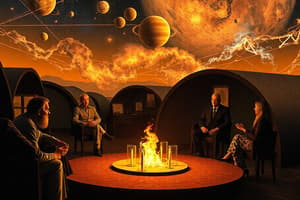Podcast
Questions and Answers
What does Platonism posit as necessary for understanding our world?
What does Platonism posit as necessary for understanding our world?
- The existence of empirical evidence
- The existence of universals (correct)
- The existence of tropes
- The rejection of metaphysics
Nominalism supports the need to posit the existence of universals.
Nominalism supports the need to posit the existence of universals.
False (B)
What is the key criterion proposed by Karl Popper to distinguish science from non-science?
What is the key criterion proposed by Karl Popper to distinguish science from non-science?
Falsifiability
In the A-Theory vs. B-Theory debate, the A-Theory emphasizes the _____ of time.
In the A-Theory vs. B-Theory debate, the A-Theory emphasizes the _____ of time.
Match the following concepts with their definitions:
Match the following concepts with their definitions:
What is the primary objection to Universalism regarding tropes?
What is the primary objection to Universalism regarding tropes?
Hume argued that miracles violate natural laws and require sufficient evidence.
Hume argued that miracles violate natural laws and require sufficient evidence.
What critique did Gaunilo offer against Anselm's Ontological Argument?
What critique did Gaunilo offer against Anselm's Ontological Argument?
Flashcards
Platonism
Platonism
The belief that abstract concepts, called universals, exist independently of the physical world and are necessary to explain our understanding of shared properties.
Nominalism
Nominalism
The view that universals do not exist independently, and shared properties are simply similarities between individual things.
Universal
Universal
An abstract concept that represents a shared property or characteristic, applicable to multiple instances.
Trope
Trope
Signup and view all the flashcards
A-Theory of Time
A-Theory of Time
Signup and view all the flashcards
B-Theory of Time
B-Theory of Time
Signup and view all the flashcards
Scientific Realism
Scientific Realism
Signup and view all the flashcards
Instrumentalism
Instrumentalism
Signup and view all the flashcards
Study Notes
Metaphysics
- Platonism: Posits the existence of universals to understand the world.
- Nominalism: Rejects the need for universals to understand the world.
- Truth in "The cat sat on the mat": Conditions necessary for truth of the statement.
- Truth in "2+2=4": Conditions necessary for truth of the mathematical equation.
- Platonism's Knowledge Problem: Fictionalism is one possible solution
Properties: Universals vs. Tropes
- Universal: Explains properties through shared characteristics, e.g., redness.
- Trope: Explains properties as unique instances, like a specific shade of black.
- Universalism Objections: Trope theory disagrees with shared properties.
- Trope Theory Objections: Universalists critique the coherence of similarity in tropes.
Temporal Relations
- A-Theory vs. B-Theory: Different views on time's passage.
Philosophy of Science
- Science: Distinguished between manifest and scientific images of the world.
- Demarcation Problem: Defining what separates science from non-science.
- Karl Popper: Proposed falsifiability as a criterion for science.
- Modus Tollens: A logical structure: If P, then Q; not Q; therefore, not P.
- Objections to Popper: Historical examples (Uranus' orbit) and the Duhem–Quine thesis.
- Issues in Actual Practice: Challenges in applying scientific principles.
Scientific Realism vs. Instrumentalism
- Scientific Realism: Scientific descriptions are real.
- Instrumentalism: Science is a prediction tool, not necessarily truth-seeking.
- Convergent Scientific Realism: Multiple theories explaining data.
Arguments Against Anti-Realism
- No-Miracles Argument: Science wouldn't be successful if not approximately true.
- Pessimistic Meta-Induction: Past scientific theories were false.
Philosophy of Religion
-
Anselm's Ontological Argument: Argues for God's existence through definition.
-
Gaunilo's Reply: Criticises Anselm with the 'perfect island' example.
-
Plantinga's Defense: Responds to Gaunilo.
-
God's Attributes: Omniscience, omnipotence, perfect goodness.
-
Hume's Responses: Critiques of the teleological argument and miracles.
-
Teleological Argument: God inferred from apparent design.
-
Miracles: Hume argues they violate natural laws and lack sufficient evidence.
-
Weighing Evidence: Hume's view on evaluating miracle claims.
-
Indirect Evidence for Miracles: Analyzing historical events as potential evidence.
-
Human Credulity: Humans tend to believe in miracles due to cultural narratives.
Studying That Suits You
Use AI to generate personalized quizzes and flashcards to suit your learning preferences.





